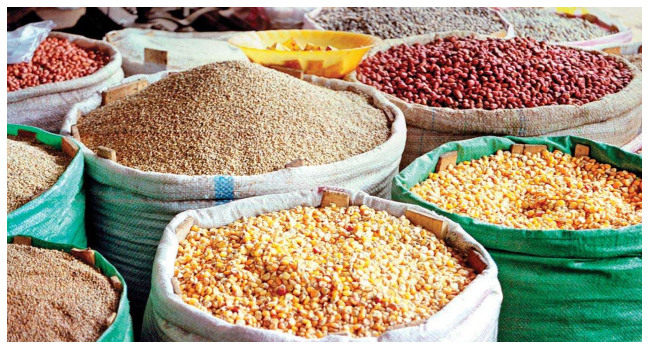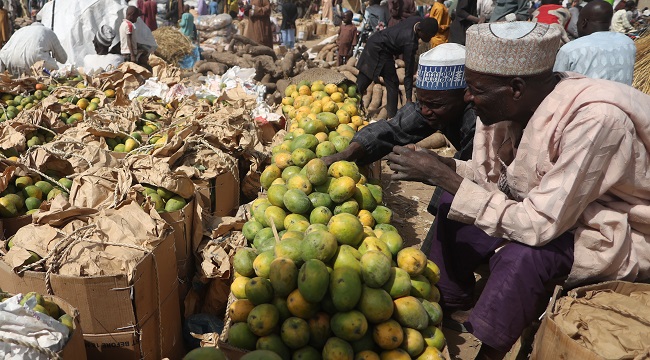More than 1m Nigerians affected by severe food crisis in 2024 — World Bank

Nigeria is facing a worsening food security crisis, with over one million additional people experiencing severe food insecurity in 2024 compared to the previous year, according to a report by the World Bank.
The recently released Food Security Update Report highlights that countries like Nigeria, Ethiopia and Yemen have seen a significant rise in the number of people facing acute food shortages.
Traders sell mangoes at the market in Jibia on February 18, 2024. – Nigeria, which shares 1,600 km of border with its neighbor, was until now one of Niger’s main trading partners with $193 million in exports in 2022 according to the United Nations (electricity, tobacco, cement, etc). Since the border closure, it has even been a double whammy for the local population, who have seen food prices explode under the combined effect of new movement restrictions and galloping inflation after the Nigerian president , Bola Ahmed Tinubu, in office since May, implemented economic reforms which plunged the country into crisis. (Photo by Kola Sulaimon / AFP)
“Conversely, some countries saw improvements. Nations such as Afghanistan, Guatemala, and Kenya reported declines in food insecurity, with more than one million fewer people facing acute food crises, although these countries remained in significant food crisis situations,” the report read.
“On the other hand, 18 countries experienced worsening situations due to factors including intensified conflict and climate-related shocks, such as droughts. Notable examples include Ethiopia, Nigeria, and Yemen, each witnessing an increase of more than one million people facing high levels of food insecurity from the previous year”.
The report attributes Nigeria’s growing crisis to a combination of climate-induced issues and socio-political instability in various regions.
Tiger nuts are sold at the market in Jibia on February 18, 2024. – Nigeria, which shares 1,600 km of border with its neighbor, was until now one of Niger’s main trading partners with $193 million in exports in 2022 according to the United Nations (electricity, tobacco, cement, etc). Since the border closure, it has even been a double whammy for the local population, who have seen food prices explode under the combined effect of new movement restrictions and galloping inflation after the Nigerian president , Bola Ahmed Tinubu, in office since May, implemented economic reforms which plunged the country into crisis. (Photo by Kola Sulaimon / AFP)
“In Nigeria, an estimated 1.6 million hectares of land have been inundated, including 342,650 hectares of cropland, affecting 685,770 vulnerable individuals. In Mali, 344,000 people were affected and 1.6 million hectares of land flooded, including nearly 500,000 hectares of cultivated land,” the report noted.
“Cameroon, Central African Republic, Côte d’Ivoire, Gambia, Guinea, Guinea-Bissau, Liberia, Sierra Leone, and Togo have also faced flooding, and northern and northeastern Nigeria and Ghana are experiencing dry spells, with adverse effects on crop production and thus food insecurity.
“In total, floods and droughts have affected approximately 3.5 million people, who require emergency support. It is estimated that $50m is needed to help 760,200 communities meet their basic food needs.”
General view of the market in Jibia on February 18, 2024. – Nigeria, which shares 1,600 km of border with its neighbor, was until now one of Niger’s main trading partners with $193 million in exports in 2022 according to the United Nations (electricity, tobacco, cement, etc). Since the border closure, it has even been a double whammy for the local population, who have seen food prices explode under the combined effect of new movement restrictions and galloping inflation after the Nigerian president , Bola Ahmed Tinubu, in office since May, implemented economic reforms which plunged the country into crisis. (Photo by Kola Sulaimon / AFP)
The report further reveals that domestic food price inflation in Nigeria remains among the highest globally, with food prices increasing by 37.5% year-on-year as of August 2024. This price surge has strained household incomes, making it increasingly difficult for low-income families to afford basic food items.
The bank called for urgent intervention to address the immediate food needs of affected populations.










